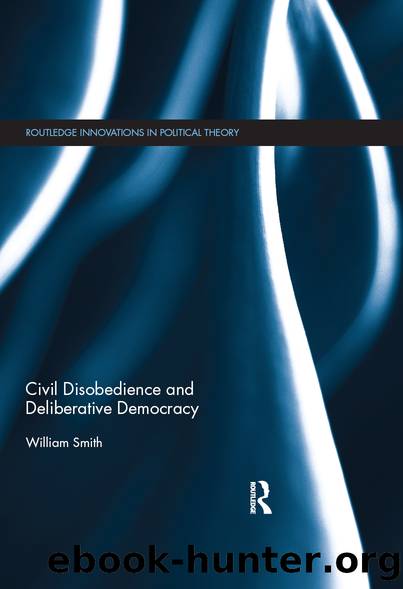Civil Disobedience and Deliberative Democracy by William Smith

Author:William Smith [Smith, William]
Language: eng
Format: epub
Tags: Political Science, General
ISBN: 9781135017545
Google: oVG2_rhKWKUC
Goodreads: 18014060
Publisher: Routledge
Published: 2012-11-30T00:00:00+00:00
Conclusion
This chapter has augmented the account of the justification and role of civil disobedience developed in the previous chapter. Let us now summarize the position that has emerged. The duty to comply with democratic institutions can be overridden by the good of communicating opposition through a non-coercive form of civil disobedience if the following three presumptive conditions hold. First, citizens should engage in good-faith efforts to pursue legal or political change within law prior to engaging in civil disobedience. Second, citizens should make reasonable efforts to coordinate their acts of civil disobedience to preserve the stability of the polity. Third, civil disobedience should be limited to protesting serious injustices and/or forms of deliberative inertia that inhibit important and urgent discourses from exercising influence over opinion- and will-formation. This account of the justification of civil disobedience allows us to ascribe to it an important role in contributing to the cognitive function of the public sphere.
The previous section defended the emerging theory of civil disobedience against important objections. In the course of this discussion, significant claims were made about the relationship between civil disobedience and deliberative democracy. It may be helpful to bring to the fore what I take to be one of the principal implications of this discussion for deliberative democratic theory. The lesson to be drawn is that, as has been argued by others, we should be sceptical about attempts to forge an exclusive association between deliberative democracy and calm and orderly discussion (Young 2000: 47â51). The good of promoting informed, inclusive and fair processes of deliberation will often be served through reasonable dialogue in formal institutional settings or through establishing small-scale and highly regulated âmini-publicsâ (Fung 2003). This very same goal will also be served, though, through diverse and unconventional forms of deliberative participation that aim to make an impact on the society-wide, highly disorganized and decentred public sphere (Chambers 2009). This means that forms of public participationâlike civil disobedienceâthat involve a certain degree of confrontation, or acts that disrupt discussion in formal settings and small-scale venues, can in principle be justifiable as a means of instigating and contributing to ongoing processes of opinion- and will-formation in a democratic society.
The discussion up to this point has focused on the moral deliberations of citizens contemplating or evaluating civil disobedience in a democratic society, identifying the principal considerations that should be taken into account. The remainder of the book broadens the discussion to engage two significant issues yet to be addressed. The next chapter explores the status of civil disobedience as a moral right. This discussion is important because such a right, if it exists, is generally thought to apply to citizens who engage in civil disobedience even if from the perspective of observers they appear to lack a compelling justification for doing so. This raises an interesting set of questions about whether and to what extent citizens might have a moral entitlement to commit civil disobedience, even if observers rightly judge that their reasons for doing so are not sufficiently weighty to override their duty to comply.
Download
This site does not store any files on its server. We only index and link to content provided by other sites. Please contact the content providers to delete copyright contents if any and email us, we'll remove relevant links or contents immediately.
The Secret History by Donna Tartt(19092)
The Social Justice Warrior Handbook by Lisa De Pasquale(12191)
Thirteen Reasons Why by Jay Asher(8912)
This Is How You Lose Her by Junot Diaz(6889)
Weapons of Math Destruction by Cathy O'Neil(6281)
Zero to One by Peter Thiel(5802)
Beartown by Fredrik Backman(5756)
The Myth of the Strong Leader by Archie Brown(5509)
The Fire Next Time by James Baldwin(5447)
How Democracies Die by Steven Levitsky & Daniel Ziblatt(5219)
Promise Me, Dad by Joe Biden(5154)
Stone's Rules by Roger Stone(5088)
A Higher Loyalty: Truth, Lies, and Leadership by James Comey(4964)
100 Deadly Skills by Clint Emerson(4926)
Rise and Kill First by Ronen Bergman(4790)
Secrecy World by Jake Bernstein(4753)
The David Icke Guide to the Global Conspiracy (and how to end it) by David Icke(4720)
The Farm by Tom Rob Smith(4514)
The Doomsday Machine by Daniel Ellsberg(4490)
